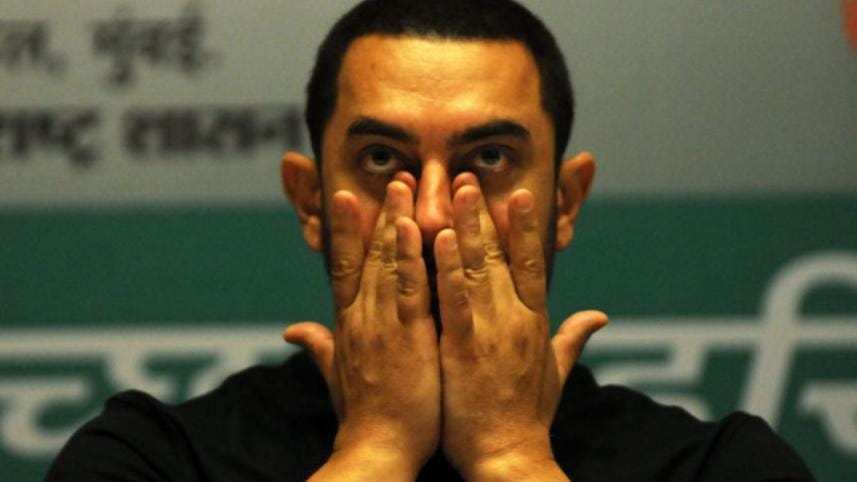Focus on Aamir Khan

I was present at the function where Aamir Khan, a leading actor, said that his wife had asked him whether they should move to some other country for healthy upbringing of their child. There was no rancour in his tone, only a bit of sadness. Still his remark shook me. Indeed, it shook the entire nation.
Never before had I realised that the things had come to such a pass that even a person like Aamir Khan would think of moving to some other country. Lesser persons from the minority communities must be terror stricken.
The return of awards by some 500 artists and intellectuals in the country is understandable. It is their way of expressing agony. Those who have not gone to that extent share the feeling of helplessness.
Aamir Khan's remarks should make the communalists sit up and ponder over what has driven the minorities to the wall. And even the most talented and sophisticated among them, like Aamir Khan, feel unsafe.
Instead the Bharatiya Janata Party (BJP) has pounced upon him and literally abused him. That India has made him and he is ungrateful are some of the remarks. He has made himself through hard work. India has appreciated him for his acting.
I concede that nothing new has happened to deserve such a remark. But this is how Aamir Khan feels. I respect his feelings. We should all introspect why a person like Aamir Khan, who is loved and admired throughout the country, should say such a thing. He must have thought about the effect it would have. He must have felt that the intolerant mood that is deepening in the country makes even a person like him redundant. His secular credentials are beyond reproach and his whole life is an open book.
Unfortunately, the debate on his statement has not been healthy. Instead of making people sit up and seek possible reasons for the observation Aamir Khan has made, there has been furore over why he dared to make the remark. Once again the perennial question of Hindu-Muslim relations has come to the fore. The tendency to sweep everything under the carpet does not help. It has been done in the past. The nation must discuss the question in its entirety. The minorities should consider themselves safe. It is what they say that counts, not what the majority says.
The reference point still remains the division. The partition is a reality. The formula was accepted by Jawaharlal Nehru and Sardar Patel, who were then leading the independence movement. True, both were reluctant to accept the partition. But when they felt that there was no option to end British rule, they agreed to the vivisection of India.
Mahatama Gandhi walked out of Governor General Mountbatten's room when he broached the partition formula. He did not want to have anything to do with it. But when the then British Prime Minister Attlee said that they would quit, with or without any settlement between the Congress and the Muslim League, Nehru and Patel faced the facts and agreed to the partition, with pain and sorrow however.
True, the line drawn on the basis of religion has been a disaster because it has left the two communities, Hindus and Muslims, at loggerheads. But this was apparently the price people had to pay to make the British quit.
Sadly, the fallout of partition has been injurious. The disconcerting part is that the two states, India and Pakistan after British rule, have become sworn enemies. Politicians on both sides are to blame because they, particularly the ones in Pakistan, have continued the same discourse of divisions and differences.
The Congress, leading the independence movement, should have explained to the people why there was no alternative to partition after Muslims were generally guided by the two-nation theory. Quaid-e-Azam Mohammad Ali Jinnah, founder of Pakistan, argued that Hindus and Muslims were two different nations. He made religion the basis of nationality. It has had detrimental consequences but he was able to rally the support of Muslims at that time.
The transfer of power was peaceful only in name. People on both sides, despite the assurances by leaders of peace and amity, left their homes to seek shelter in a country of their own community. Never before in history had there been such a bloodbath. Some 10 million from both communities were killed and many times more driven from their homes.
Till today the wounds have not healed. On the contrary, the two countries have fought three inconclusive wars. And there is no prospect of durable peace. Muslims have lost importance in India although there are more than 15 crore of them. And Hindus in Pakistan constitute less than two percent of the population.
After independence, Pakistan declared it would be an Islamic state and adopted the constitution accordingly. India chose to be a secular state. Despite making up 80 percent of the population, Hindus preferred to be ruled by a constitution which put secularism in the preamble itself. There is equality before the law and no Indian is inferior to another on the basis of religion. However, Muslims count for very little in the affairs of the state.
The fact that there is a joint electorate, unlike before the partition, helps the community. But it is only up to the polls. Once the elections end, other factors take over and Muslims are ignored. The hiatus between Hindus and Muslims reappears as it was before the polls. And this is the situation India still faces.
The writer is an eminent Indian columnist.

 For all latest news, follow The Daily Star's Google News channel.
For all latest news, follow The Daily Star's Google News channel.
Comments